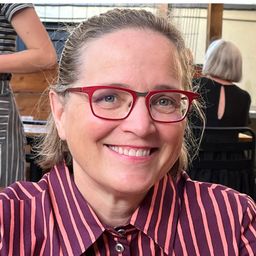
Seana Irvine
I am pursuing my PhD in Interdisciplinary Social Research at Trent University (Peterborough, Ontario) where I’m exploring how post-industrial landscapes can be repurposed to create more inclusive cities. I'm interested in understanding how the redevelopment and transformation of formerly industrial landscapes into cultural and economic hubs can be undertaken in ways that advance a public agenda of social inclusion and economic opportunity. Throughout my career, I've focused on community-based, participatory design and engagement processes, leading low carbon redevelopments, launching social enterprises and strengthening social innovation networks from the local to the international while serving in executive positions for entrepreneurial not-for-profit organizations. Much of my career involved the adaptive reuse of Toronto’s Don Valley Brick Works from an abandoned brick factory and brownfield, into a LEED platinum, award winning showcase for innovation and sustainability. As one of the project’s founding team members, I developed the original visitor program and interpretation experiences that celebrated the site’s industrial and ecological heritage, highlighted worker stories and engaged visitors in tangible environmental actions that create healthier cities.
Sessions auxquelles Seana Irvine assiste
Dimanche 28 Août, 2022
Vous êtes invités au lancement du livre "Deindustrializing Montreal : Entangled Histories of Race, Residence and Class" le dimanche 28 août (13h-15h) à la brasserie Les Sans Taverne du Batiment 7 (1900 rue Le Ber) à Pointe-Saint-Charles. Deindustrializing Montre...
Joignez-vous aux organisateurs du congrès et aux membres du board de TICCIH pour un cocktail de bienvenue et quelques mots festifs de présentation, dans l’ancienne forge de l’École technique de Montréal, fondée en 1909, aujourd’hui intégrée au campus de l’Université du Québec à Montréal.
Lundi 29 Août, 2022
This session presents case studies and policy reviews that contribute to ongoing debate and international dialogue on the role of planning systems and conservation practices in addressing the challenges of citizen engagement—conserving local interests, place attachments alongside physical remnants of industrial heritage. Over the past half century, we have witnessed the development and changing focuses of urban planning and conservation discourses addressing industrial heritage. Relevant p...
This session presents case studies and policy reviews that contribute to ongoing debate and international dialogue on the role of planning systems and conservation practices in addressing the challenges of citizen engagement—conserving local interests, place attachments alongside physical remnants of industrial heritage. Over the past half century, we have witnessed the development and changing focuses of urban planning and conservation discourses addressing industrial heritage. Relevant p...
Si la vallée du canal de Lachine a été le berceau de l’industrialisation canadienne, la géographie industrielle métropolitaine ne s’y est pas confinée, peu s’en faut, Outre les grandes concentrations d’entreprises des quartiers centraux, elle est constituée des réseaux infrastructuraux, d’une douzaine de centrales hydroélectriques et des ensembles manufacturiers disséminés dans une quinzaine de petites villes aujourd’hui intégrées dans l’aire métropolitaine. La conférence proposera un surv...
Mardi 30 Août, 2022
This session focuses on company towns from the perspective of urban planning. “Company towns” are here defined as single-enterprise planned communities, usually centered around a single industry, where a company commissions an urban plan, builds housing for its workers, and sets up recreational, commercial, institutional or community facilities. While these are now endangered by a second wave of deindustrialization, we observe that, aside studies or monographs of individual towns that popu...
Community lies at the heart of the processes of industrialization and de-industrialization. From labor to landscapes and from social fabric to ecological communities, scholars regularly examined the industrial community as core to industrial heritage. However, while social scientists have long studied industrial communities, only recently has there been a general consensus of respecting and working with communities themselves. Even so, working “with” a community on industrial heritage has ...
Pendant cette pause déjeuner, vous pouvez venir discuter avec l'auteur de son dernier livre.Cette discussion aura lieu à la table DePOT, dans le hall principal de la conférence. DePOT fait référence au groupe "Deindustrialization and the Politics or our Time" ; on y examine les racines historiques et l'expérience vécue de la désindustrialisation ainsi que les réponses politiques à celle-ci. Il s'agit d'un projet de partenariat du CRSH regroupant 33 organisations partenaires et...
Les efforts visant à préserver le patrimoine industriel s'inscrivent dans un contexte socio-économique et politique précis. Mais qu'est-ce qui est préservé et pour qui ? Et, par ailleurs, quelle est la relation entre les sites du patrimoine industriel et les communautés ouvrières soumises à la désindustrialisation qui les jouxtent souvent ? Steven High examinera les façons dont la préservation du canal de Lachine à Montréal, le principal site du patrimoine i...
Mercredi 31 Août, 2022
Ce tour propose une excursion sur un pont privatisé du bateau-mouche de Montréal; une visite commentée ludique permet de découvrir quelques hauts-lieux du paysage industriel de la ville depuis le fleuve Saint-Laurent. La visite est tarifée pour couvrir les frais supplémentaires; le tarif inclut l'accès au bateau-mouche, l'excursion et une boisson.Le départ se fera à pied depuis le lieu d...
In this lecture, I would like to talk about deindustrialised communities, heritage and memory in the context of right-wing populism. Drawing on studies of memory and heritage, I argue that right-wing populists have cornered the market on talking about the past of deindustrialised communities. They have successfully misrepresented this rich and complex history to fuel rage, resentment, fear and reactionary nostalgia. Indeed, ‘the past’, and in particular the industr...
Jeudi 1 Septembre, 2022
This lecture will argue that the landscapes of industrial heritage that can be found in different parts of the world are directly related to the place-specific trajectories of deindustrialization. In other words: the different ways in which deindustrialization impacts on local communities has a direct bearing on the emergence of forms of industrial heritage. I will differentialte between deindustrialization paths and related industrial heritage regimes in a) Anglo-...
Vendredi 2 Septembre, 2022
In the refusal of people in communities abandoned by industrial capital to abandon their own places, we can read an implicit critique of the mobility and unaccountability of capital, raised by those who were once inside (however tenuously or uncomfortably) and now find themselves marginalized, “left behind.” The desire to catch up again, whether through attracting new investment or transvaluing abandoned sites as tourist attractions, makes this an essentially conservative critique that is ...




